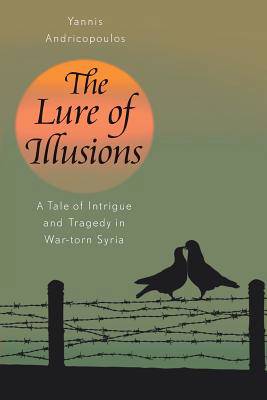
- Retrait gratuit dans votre magasin Club
- 7.000.000 titres dans notre catalogue
- Payer en toute sécurité
- Toujours un magasin près de chez vous
- Retrait gratuit dans votre magasin Club
- 7.000.000 titres dans notre catalogue
- Payer en toute sécurité
- Toujours un magasin près de chez vous
The Lure of Illusions
a tale of intrigue and tragedy in war-torn Syria
Yannis AndricopoulosDescription
Life in Damascus for Ari Boletis, UNRWA's chief information officer in the Syrian capital, and Laura Heineken, the BBC journalist, is overshadowed by the civil war that has crippled the country. They are in love with each other and cherish their moments together, but at the same time they have to deal with the threats emanating from terrorist groups, criminal gangs or the ruthless state apparatus.
One day Laura is found dead in the rebel-held outskirts of Damascus. Her killers could be agents of Bashar al-Assad's notorious secret police, members of terrorist organisations or, as Laura herself feared when still alive, high-ranking officers of the Jordanian intelligence. The latter, as she had discovered, were heavily involved in the black-marketing of weapons sent by the Americans for delivery to the Syrian rebels.
Ari sets as his task to identify Laura's killers. In doing so, he moves from neighbourhoods ruined by the war to the capital's high life districts and from the regime's security headquarters to rebel-held areas. In the process, he acquaints himself fully with the interminable Middle Eastern violence and the cruel world of politics.
The latter is underscored not only by the savagery of the jihadis and the interweaving brutal conflicts between all parties involved in this war but also by the recklessness of the West's Middle Eastern policy which has irrevocably turned the entire region into a battlefield. As Ari discovered when he came across a major incendiary plot, it has also turned the West into the hostage of its regional allies and trapped Washington into situations that could easily lead to the-end-of-the-world final battle.
The story is fictional, yet it develops against a political background that reflects the impetuous pursuit of self-interest in a world that no longer sees madness as an abnormality but as a lubricant. Politics has ended up at the mercy of its protagonists' illusions, each one of them convinced that the future is their property.
Spécifications
Parties prenantes
- Auteur(s) :
- Editeur:
Contenu
- Nombre de pages :
- 316
- Langue:
- Anglais
Caractéristiques
- EAN:
- 9781911593171
- Date de parution :
- 19-12-17
- Format:
- Livre broché
- Format numérique:
- Trade paperback (VS)
- Dimensions :
- 156 mm x 234 mm
- Poids :
- 444 g







